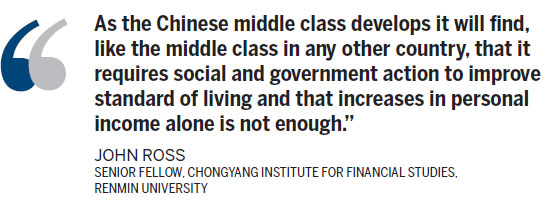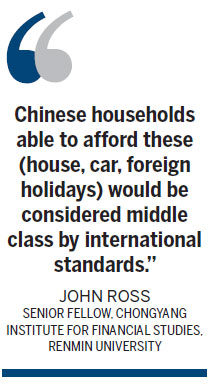Defining middle-class



The hottest market sector of the Chinese population will stimulate the country's development in many ways, one analyst tells Liu Wei.
John Ross, senior fellow, Chongyang Institute for Financial Studies, Renmin University, analyzes the Chinese middle class in relation to both China and the Western world.
How do you define the Chinese middle class?
To be meaningful, 'middle class' must refer to international standards for incomes equivalent to developed countries. That would include ownership of a house, ownership of a car, the ability to take an annual foreign or prosperous domestic holiday. Chinese households able to afford these would be considered middle class by international standards.
Compared to the middle class in Western countries, what's unique about the Chinese?
The main specific feature of Chinese middle-class families is the extremely high proportion of their income that goes to housing. This is far higher than in Western countries. For example, the price of an apartment in Beijing or Shanghai is not greatly below the price of an apartment in London but, of course, average income in Beijing and Shanghai is much lower than in London. In all countries, the cost of buying a house is considerable but the cost relative to salary is much higher in China.
The Chinese middle class can afford houses, cars and shopping abroad, but some basic elements of life, like clean air, water and food are hard to come by. How do you see that?
This is a feature of China's specific stage of development. China's GDP per person is equivalent to the UK at the beginning of the 1950s, although China's current economic growth rate is far higher than the UK at that time. As such, it will not take 50 years for China to catch up.
There was the catastrophic London smog of 1952 from which 12,000 people died. It took approximately 15 years of very determined policies to overcome this problem in London. This was symbolized in the UK's Clean Air Act.
If China adopts similarly strong policies for reducing smoke and vehicle emissions, reducing pollution by power stations etc, these problems will also be overcome.
It is for these reasons that the development of a middle class requires not only increases in personal income but also increases in government expenditure as only State action can deal with such problems as pollution.
Therefore, the middle class' calls for relevant policies by the government will rise as well.
Related:






















